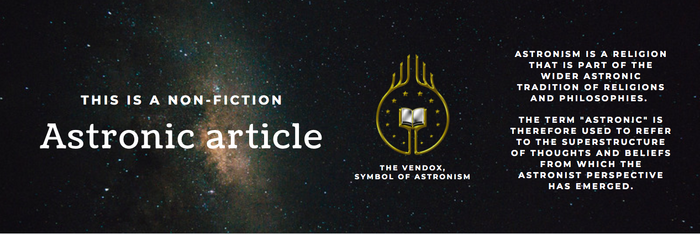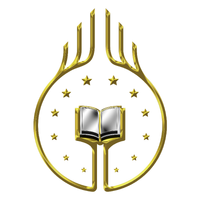No edit summary Tag: Visual edit |
No edit summary Tag: Visual edit |
||
| Line 1: | Line 1: | ||
| ⚫ | |||
| − | {{Astronism Notice}}[[File:Vendox Millettism Symbol.png|thumb|220x220px|[[Vendox|The Vendox]], the universal symbol of [[Astronism]].]] |
||
| + | |||
| − | {{Appellations of Millettism}} |
||
| + | '''Cosmism''', also known as '''Astronist cosmism''', '''Astronic cosmism''', or popularly referred to as '''Neocosmism''', is a religious philosophy that constitutes a major dimension of [[Astronism]], particularly the [[Soteriology of Astronism|soteriology]] of the [[Astronist religion]]. Its central premise states that [[The Cosmos]], as the animate, natural wholeness of existence, occupies the role of determining the order, nature, pattern and structure of events that occur within it. As such, The Cosmos is the embodiment of order that proceeds on behalf of [[The Divine]] within its cosmic quarters or limitations. |
||
| ⚫ | |||
| + | |||
| + | The cosmic force that is known as the [[Astran]] is the principle that governs The Cosmos in terms of its characteristics as the conveyer of order, pattern, structure, and continuation and is particularly associated with the [[astronomical world]]. The Astran is the philosophical and religious manifestation of natural forces in their totalities and especially in regards to how they obstruct, benefit or neutralise the affairs of animate beings (e.g. humans, animals etc.). |
||
| + | |||
| + | As such, keeping in alignment with the Astran means to accept the superiority of the astronomical world, to understand that The Cosmos is central to the role of [[transcension]], and that the realisation and subsumption of humanity are integral to knowing, feeling and experience truths about The Cosmos. |
||
| + | |||
| + | Astronist cosmism is considered a descendant of some of the basic principles of [[Russian cosmism]]. Some have interpreted Astronist cosmism as a form of [[Pantheism in Astronism|pantheism]] or as a natural theology, but the [[Astronist Institution]] persists in its designation of Astronism as an astrotheistic religion with elements of [[Panentheism in Astronism|panentheism]] and [[depadotheism]]. |
||
| − | '''Cosmism''', also known as '''Millettic cosmism''', '''Astronic cosmism''', and popularly known as '''Neocosmism''', is one of the primary appellations for [[The Philosophy of Millettism]] which remains in close association to the [[pre-Millettic]] philosophy known as [https://en.wikipedia.org/wiki/Russian_cosmism Russian cosmism]. Although not directly addressed by [[Cometan]] in the [[Omnidoxy]], the founder of Millettism was later quoted as saying that "Millettic cosmism holds some thematic ties with its pre-Millettic Russian ancestor." |
||
[[Category:Astronism]] |
[[Category:Astronism]] |
||
| − | [[Category: |
+ | [[Category:Soteriology of Astronism]] |
Revision as of 12:43, 2 July 2020
This article is about a non-fiction entity related to the Astronist belief system or the Astronic tradition.
Any article relating to a fictional entity will be clearly marked as being part of the Spacefaring World.
Not to be confused with Russian cosmism, Huge de Garis' cosmism, or Cosmicism.
Cosmism, also known as Astronist cosmism, Astronic cosmism, or popularly referred to as Neocosmism, is a religious philosophy that constitutes a major dimension of Astronism, particularly the soteriology of the Astronist religion. Its central premise states that The Cosmos, as the animate, natural wholeness of existence, occupies the role of determining the order, nature, pattern and structure of events that occur within it. As such, The Cosmos is the embodiment of order that proceeds on behalf of The Divine within its cosmic quarters or limitations.
The cosmic force that is known as the Astran is the principle that governs The Cosmos in terms of its characteristics as the conveyer of order, pattern, structure, and continuation and is particularly associated with the astronomical world. The Astran is the philosophical and religious manifestation of natural forces in their totalities and especially in regards to how they obstruct, benefit or neutralise the affairs of animate beings (e.g. humans, animals etc.).
As such, keeping in alignment with the Astran means to accept the superiority of the astronomical world, to understand that The Cosmos is central to the role of transcension, and that the realisation and subsumption of humanity are integral to knowing, feeling and experience truths about The Cosmos.
Astronist cosmism is considered a descendant of some of the basic principles of Russian cosmism. Some have interpreted Astronist cosmism as a form of pantheism or as a natural theology, but the Astronist Institution persists in its designation of Astronism as an astrotheistic religion with elements of panentheism and depadotheism.


